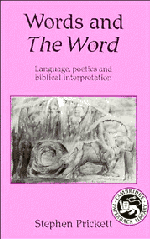5 - Metaphor and reality
Published online by Cambridge University Press: 01 March 2011
Summary
Even such a brief and necessarily incomplete survey as that of the last three chapters suggests something of the complexity of the idea of the ‘poetic’ in the past few hundred years. Merely the fact that it can, and has been, invoked by representatives of such essentially different exegetical traditions as Nineham and Ricoeur indicates the range of the diverse positions it can be used to support. Moreover such divergences are not a matter of twentieth-century confusions of an originally simple idea: they continue ambiguities that were always present. We only have to look at the contrasts between Vico and Dennis, Coleridge and Arnold, to see how the ‘poetic’ has always contained opposite connotations of primitiveness and sophistication, falsification and insight, picture-language and symbolic truth.
What bearing, then, does this complex web of apparently contradictory notions have on the problems with which we began? – the seeming inability of modern translators of all persuasions to cope with a difficult passage of the Old Testament. That inability, we discovered, stemmed in part at any rate from the inadequacy of current conceptual models for dealing with cultural change and the emergence of the ‘new’. This failure has had profound and traumatic consequences for biblical interpretation and translation. Indeed, it is hardly over-stating the case to say that in the last three hundred years it has become the central problem of biblical criticism.
- Type
- Chapter
- Information
- Words and The WordLanguage, Poetics and Biblical Interpretation, pp. 196 - 242Publisher: Cambridge University PressPrint publication year: 1986



